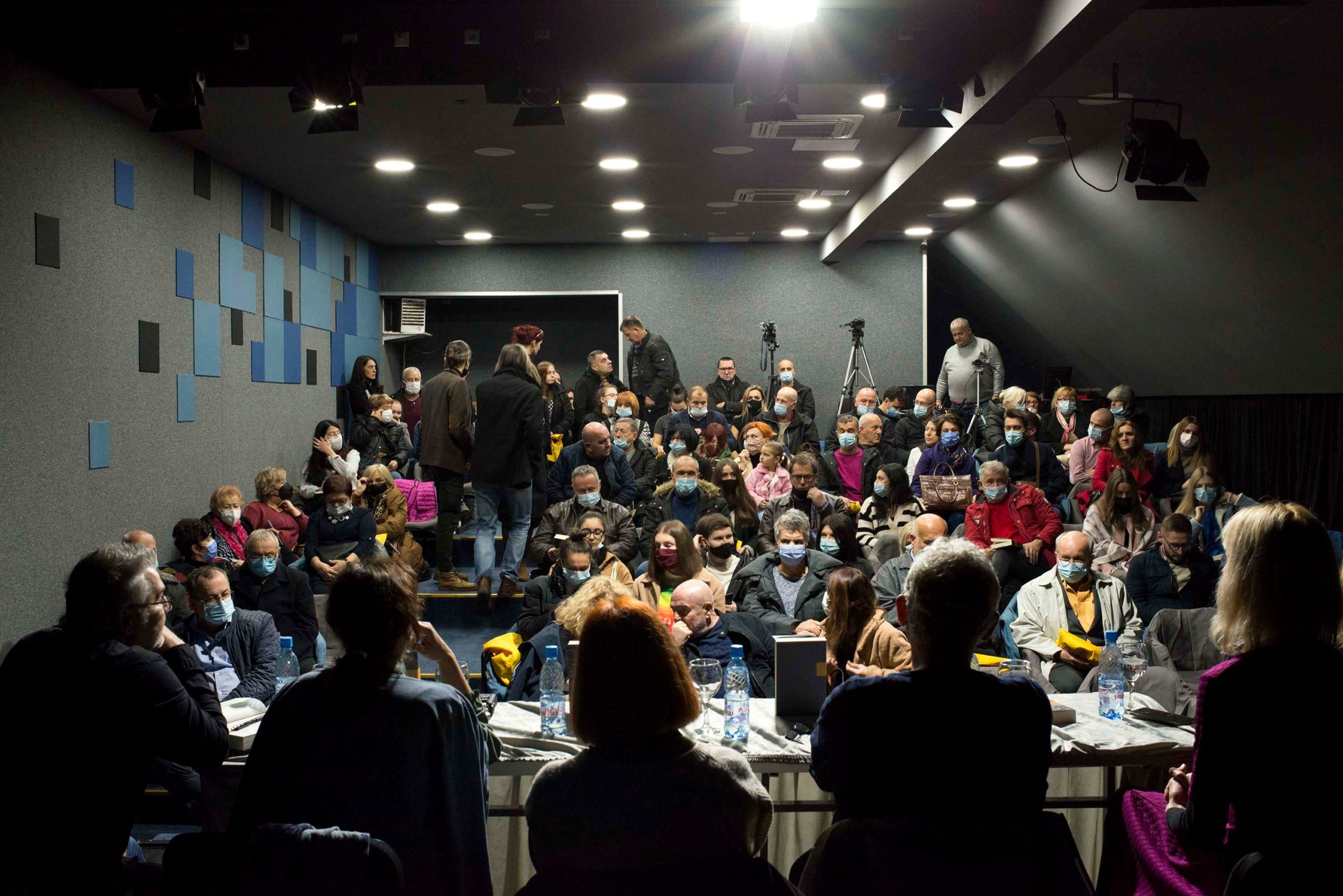Biber 04, a collection of anti-war short stories and short stories about reconciliation, was promoted in Bugojno on 9 November 2021.
The small stage at the Culture and Sports Centre was the packed venue where the panel discussion on the publication of the Biber 04 Collection hosted the authors of several stories included in the Collection: Marijana Čanak from Novi Žednik (author of “Razmjena” [Exchange]), Senad Jusić from Bugojno (author of “Kako je Dado postao drvo” [How Dado Became a Tree]), Aleksandra Jovanović from Vranj (author of “Bitka izjutra” [Morning Battle]), Irena Skopljak Barić from Vrbovac (author of “Igra: Kraj” [Game: Over]). Davorka Turk from Sarajevo/Zagreb was there representing the Biber Team, and the moderator was Ivor Fuka from Bugojno, editor of the Lupiga web portal.
Introductory speeches were given by Professor Viktor Dundović from the Bugojno Gymnasium and the Mayor of Bugojno Hasan Ajkunić.
Davorka Turk, a member of the Biber Team, explained what the Biber Contest was about and why it was launched and said that the basic idea behind it was to introduce stories from our neighbours that we knew little about.
The discussion touched upon what made the individual authors decide to enter their stories in the contest. “I’ve been following the Biber Contest since the beginning, and I knew I had a story I wanted to tell, so this time I entered. My story is about the plight of children in war, because I was a child myself during the war in Vitez,” said Irena Skopljak Barić.
“I’m a child of the 1990s, the generation that did not experience the war. I wrote about the position of a woman seeing her son off to war, an unnamed war,” said Aleksandra Jovanović from Vranj. Senad Jusić added, “I liked the idea behind the contest, because I am a veteran of the war. As the criminals are released from prison, often early because of good behaviour, they are lifted onto pedestals. I wanted to write about a criminal from a different angle.”
The panellists also talked about how literature can influence social change. Senad spoke about not being an optimist in thinking that literature can change society, because society changes faster than literature, but literature can help us be just a bit better people. He added that all those who call for war and sacrifice are, thank goodness, alive and well, and quoted Marko Vešović: “No war has ever made a single mother smile.”
Marijana Čanak said, “Life and literature are inseparable. Wherever we exist as human beings, literature too will exist, either as oral literature, passed from generation to generation, etched in stone or in a collection such as this one. I believe the role of the writer is to tell the story and keep society vigilant. I think literature has an invaluable power, it’s just a matter of how we use it.” Aleksandra Jovanović added that literature, like art, is necessarily engaged in and of itself.
Ivor Fuka asked Aleksandra Jovanović, as a representative of the younger generation, about how much of the trauma of older generations has been passed on to her generation, to which she replied, “A lot. Of the trauma and everything else. But we don’t have such divisions, except those of us still poisoned. More and more, young people are wiping out such borders.” Talking about our society, she said, “We watch movies and cry for the Jews who perished in Auschwitz, we cry for the African slaves, but we choose to stay silent and not cry when it comes to our neighbours.”
Davorka Turk said that these stories provide motivation to those already working on reconciliation. “People tend to cling to their national identity when they feel it is under threat. I cannot ask anyone else to forgive, everyone must come to that decision for themselves, but what we are trying to achieve is a way to reach justice without having anyone else suffer injustice,” Davorka pointed out.
The discussion was organised by the Bugojno Cultural and Sports Centre (KSC), the Bugojno Gymnasium and the Centre for Nonviolent Action Sarajevo-Belgrade.
This was the first promotion of the Collection in BiH, following its promotions in Podgorica and Novi Sad.

Biber is a short story contest for engaged stories in Albanian, Macedonian, Bosnian, Croatian, Serbian and Montenegrin. The theme of the contest is reconciliation in the context of the aftermath of the wars and violence in the countries of former Yugoslavia, but also eligible are stories that can contribute to better understanding among people, reducing hatred and dismantling prejudice, anti-war stories, stories about dealing with the past, deconstructing images of the enemy, about empathy, brave stories that dare walk in the “enemy’s” shoes, stories that push boundaries and open up the way to build a more stable, safer and freer future for all.
The contest is organised by the Biber team of the Centre for Nonviolent Action Sarajevo-Belgrade.
The fourth Biber Contest was opened in late April 2020. There were around 750 entries. The jury was made up of: Tatjana Gromača, Anton Berishaj and Selvedin Avdić.
The launch of the 5th Biber Short Story Contest on the same topic has been announced for Human Rights Day, 10 December 2021.
The Biber 04 collection, as well as all the previous collections are available in PDF and Kindle format on the Biber website.
A photo gallery from the Biber promotion in Novi Sad can be viewed here.